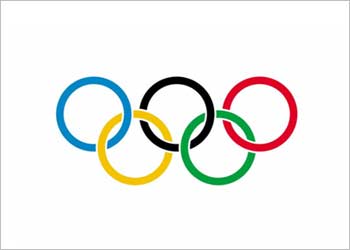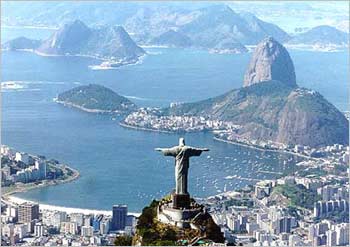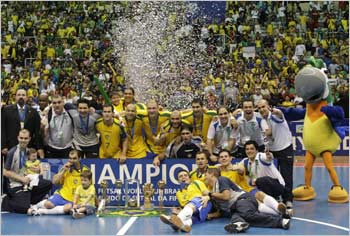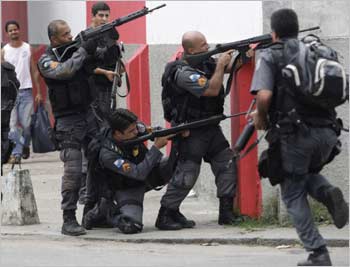
B S Prakash, India's ambassador to Brazil, looks at how the football World Cup in five years and the Olympics thereafter could resurrect Rio to its full glory.
Citius, Altius, Fortius Latin for 'Swifter, Higher, Stronger,' thus the official Olympics motto. When on October 2, the city of Rio de Janeiro was chosen to host the 2016 Olympic Games, those of us who know Rio were delighted but also surprised.
All the striving, heaving and sweating associated with the motto is not the spirit of the city of Rio. Its unstated motif seems to be more like 'relax, lay-back and enjoy.' But there is another more informal motto of the Olympics, also widely known -- 'The most important thing is not to win but to take part.; This is apt for Rio: To join the party, to participate, to have fun, and this is what won the Olympic bid for the city and for Brazil.
Every election, every win, has something to do with politics, be it, President Obama winning the Nobel, or Rio winning the Olympics. For the 2016 Olympics there were four formidable candidates: Chicago, Tokyo, Madrid and Rio.
How did Rio get it? To understand this, we must look at another Olympic symbol, apart from the motto: the white flag with five interlocked circles. This flag going back to 1914 has five circles in different colours to represent the five continents.
Notwithstanding the aspiration to be universal, to date two of the continents -- Africa and South America -- have never hosted the Olympics since the inception of the modern games in 1896. This factor was the most attractive feature in Rio's bid which trumped Chicago despite Obama's appeal, and Madrid in spite of the Olympic patriarch Juan Antonio Samaranch's long campaign.
As soon as its bid won, the infectious joy and spirit of fun that the city epitomises was seen in the cold and formal atmosphere of the venue where it was decided, Copenhagen, with the Brazilian delegation led by their charismatic and effervescent President Luiz Inacio Lula da Silva hugging others and openly crying with joy. And in the city of Rio, ever ready for a party, the outpouring of music and dance and the inpouring of caipirinha, the famous sugarcane based cold but potent drink, lasted all night.

I should know, because every potential visitor from Mumbai coming to do business in the mega city of Sao Paulo, or every sarkari type coming to Brasilia the capital for an IBSA (India, Brazil, South Africa] or a BRIC (Brazil, Russia, India, China) event, is always aspiring to see Rio. I have to tell them that Brazil is so huge a country that all these are distant and separate destinations.
What lies beneath Rio's fame and appeal as a cidade maravilhosa, the city marvelous?
First, its magnificent natural setting (as you can see in the pictures here). It is a combination of elements: The Atlantic ocean, with its shifting colours throughout the day with the interplay of bright sun and clouds, the high hills virtually jutting into the sea, the verdant green rainforest as a part of the city -- the largest urban forest in the world, and the distinctive rocks rising from the bay which are the signature of the city, the most famous being Pao de Acucar or the Sugarloaf mountain, captured in a thousand photographs.
Each of these is splendid and their coming together is a natural wonder. A few other cities have the mountains and the ocean next to each other: Cape Town, Beirut, San Francisco; all of them are spectacular. Rio has in addition the granite rocks marking it. And on top of one of them, the 38 meter statue of 'Christ the redeemer,' voted recently along with the Taj Mahal as one of the seven man made wonders of the world.
Christ from his high pedestal on top of Rio looks down benignly on the people of the city, the Cariocas as they are called, around seven million of them.
What makes Rio special are these people too. On my first visit to Rio it seemed to me that these seven million were all on the beaches: Sunbathing, jogging, playing volleyball, doing impossible calisthenics, or simply getting drunk.
I have learnt now that despite the appearance there are real people in Rio going about their work and going back to their homes. But as I said the city seems to live forever on its beaches in a permanent party spirit.

Why? Because you see all around you, marvelously fit, tanned, taut athletic bodies, even at seventy, in the skimpiest of clothes -- invariably bare-chested if masculine, and with those tantalising triangular Brazilian bikinis otherwise -- running, frolicking, jumping into the surf, or in a hundred other ways showing off their joy in the human body. If for nothing else, for the sheer physicality of its people, Rio makes a great Olympic locale.
There are at least three other features, again all of which are exuberant and physical, which Rio de Janeiro is internationally known for: Samba, the Carnival and football. Samba is both a style of music and a form of earthy and energetic dance, which I feel few Indians should ever attempt.
It is all about long and sinuous limbs, the vigour and energy of tandava if you think of Samba-shiva, and a pulsating rhythm where even the most fit are breaking out in sweat.
The dance owes its origins to a part of Brazil's African ancestry, but today Rio is the home of hundreds of famous Samba schools. The annual Carnival of Rio and -- who has not seen the pictures of this orgy -- is the spirit of Samba carried to excess. It is a weeklong dedication to hedonism, I hear, but I am yet to see it to give an authentic description.
Rio is also the home of Maracan stadium, one of the most celebrated for football, and a Mecca for the millions of fans in this football crazy land. And not to forget, the venue where the final of the FIFA World Cup will be played in 2014.
Yes, before the Olympics, the other mega spectator event, the World Cup, is also to be staged in Rio. Apart from football and its many stars Pel , Ronaldo, Kaka, Brazilians are also great at Formula one racing, ocean surfing, beach volleyball and hand gliding, all of which are a part of the sportsscape of Rio.

Two of them need to be mentioned and kept in mind as I keep telling all our Indian visitors: violent crime and favelas, the Brazilian word for slums or shantytowns, which are seen in all parts of the city.
The slums have come into being from the sixties and are now a part of the Rio reality and that too occupying many of the hills. These are dangerous places with drugs, gang warfare and other vices.
The huge disparities in income and the easy lure of looting tourists have also made Rio infamous for violent crime, a serious blot on its earlier reputation.
Rio certainly needed a revival. It used to be the capital during the colonial period under Portugal for two hundred years till 1822. When Brazil got its independence in that year, Rio continued as the capital till 1960 when the new city of Brasilia was built as the capital.
Brazilians know that Rio's infrastructure needs an upgrade, some of its fading splendour needs a facelift, and that its social problems need solutions. Brazil's Olympic bid was the most ambitious in financial terms too to meet all these challenges.
The World Cup in five years and the Olympics thereafter will be the call for Brazil to resurrect Rio to its full glory. They are expected to do it, not with grim determination and pious declarations since it is not their style but with a song on their lips and a swing in their hips.
B S Prakash is the Indian Ambassador in Brazil and can be reached at ambassador@indianembassy.org.br